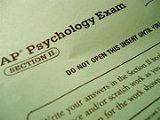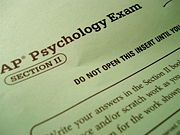
AP Psychology
Encyclopedia
- This article relates to the APAdvanced Placement ProgramThe Advanced Placement program is a curriculum in the United States and Canada sponsored by the College Board which offers standardized courses to high school students that are generally recognized to be equivalent to undergraduate courses in college...
test. For information about the IB test, see IB Psychology SL.
The Advanced Placement Psychology (AP Psychology or AP Psych) course and corresponding exam is part of the College Board's
College Board
The College Board is a membership association in the United States that was formed in 1900 as the College Entrance Examination Board . It is composed of more than 5,900 schools, colleges, universities and other educational organizations. It sells standardized tests used by academically oriented...
Advanced Placement Program
Advanced Placement Program
The Advanced Placement program is a curriculum in the United States and Canada sponsored by the College Board which offers standardized courses to high school students that are generally recognized to be equivalent to undergraduate courses in college...
. This course is tailored for students interested in the field of psychology
Psychology
Psychology is the study of the mind and behavior. Its immediate goal is to understand individuals and groups by both establishing general principles and researching specific cases. For many, the ultimate goal of psychology is to benefit society...
and as an opportunity to earn placement credit or exemption from a college
College
A college is an educational institution or a constituent part of an educational institution. Usage varies in English-speaking nations...
-level psychology course. It was the shortest AP exam until AP Physics C
AP Physics C
Part of the College Board's Advanced Placement Program, consisting of two separate courses:*AP Physics C: Mechanics*AP Physics C: Electricity and Magnetism...
exam was split into two separate exams in 2006.
Topics covered
The College Board provides a course of study to help educators prepare their students for the AP Psychology exam. The exam covers the following areas. The percentage indicates the portion of the multiple-choice section of the exam focused on each content area:- History and ApproachesHistory of psychologyThe history of psychology as a scholarly study of the mind and behavior dates back to the Ancient Greeks. There is also evidence of psychological thought in ancient Egypt. Psychology was a branch of philosophy until the 1870s, when psychology developed as an independent scientific discipline in...
(2-4%) - Research methods Testing and Individual Differences (8-10%)
- BiologyBiologyBiology is a natural science concerned with the study of life and living organisms, including their structure, function, growth, origin, evolution, distribution, and taxonomy. Biology is a vast subject containing many subdivisions, topics, and disciplines...
(8-10%) - SensationSensationSensation is the fiction-writing mode for portraying a character's perception of the senses. According to Ron Rozelle, “. . .the success of your story or novel will depend on many things, but the most crucial is your ability to bring your reader into it. And that reader will be most completely...
and PerceptionPerceptionPerception is the process of attaining awareness or understanding of the environment by organizing and interpreting sensory information. All perception involves signals in the nervous system, which in turn result from physical stimulation of the sense organs...
(6-8%) - LearningLearningLearning is acquiring new or modifying existing knowledge, behaviors, skills, values, or preferences and may involve synthesizing different types of information. The ability to learn is possessed by humans, animals and some machines. Progress over time tends to follow learning curves.Human learning...
(7-9%) - CognitionCognitionIn science, cognition refers to mental processes. These processes include attention, remembering, producing and understanding language, solving problems, and making decisions. Cognition is studied in various disciplines such as psychology, philosophy, linguistics, and computer science...
(8-10%) - States of ConsciousnessConsciousnessConsciousness is a term that refers to the relationship between the mind and the world with which it interacts. It has been defined as: subjectivity, awareness, the ability to experience or to feel, wakefulness, having a sense of selfhood, and the executive control system of the mind...
(2-4%) - MotivationMotivationMotivation is the driving force by which humans achieve their goals. Motivation is said to be intrinsic or extrinsic. The term is generally used for humans but it can also be used to describe the causes for animal behavior as well. This article refers to human motivation...
and EmotionEmotionEmotion is a complex psychophysiological experience of an individual's state of mind as interacting with biochemical and environmental influences. In humans, emotion fundamentally involves "physiological arousal, expressive behaviors, and conscious experience." Emotion is associated with mood,...
(6-8%) - Developmental PsychologyDevelopmental psychologyDevelopmental psychology, also known as human development, is the scientific study of systematic psychological changes, emotional changes, and perception changes that occur in human beings over the course of their life span. Originally concerned with infants and children, the field has expanded to...
(7-9%) - PersonalityPersonality psychologyPersonality psychology is a branch of psychology that studies personality and individual differences. Its areas of focus include:* Constructing a coherent picture of the individual and his or her major psychological processes...
(5-7%) - Abnormal PsychologyAbnormal psychologyAbnormal psychology is the branch of psychology that studies unusual patterns of behavior, emotion and thought, which may or may not be understood as precipitating a mental disorder...
(7-9%) - Treatment of Psychological Disorders (5-7%)
- Social PsychologySocial psychologySocial psychology is the scientific study of how people's thoughts, feelings, and behaviors are influenced by the actual, imagined, or implied presence of others. By this definition, scientific refers to the empirical method of investigation. The terms thoughts, feelings, and behaviors include all...
(8-10%)
The Exam

Multiple choice
Multiple choice is a form of assessment in which respondents are asked to select the best possible answer out of the choices from a list. The multiple choice format is most frequently used in educational testing, in market research, and in elections-- when a person chooses between multiple...
section (about 100 questions) and a 50 minute free response
Free response
Free response is a type of question used in tests in education, workplace, and government. Most free response questions ask or require the test-taker to state a belief, opinion, or write a short essay and support it with facts, examples, or other evidence...
section (2 prompts). The multiple choice forms two-thirds of the grade and the free-response provides the remaining third.
Beginning with the May 2011 AP Exam administration, total scores on the multiple-choice section will be based only on the number of questions answered correctly. Points will no longer be deducted for incorrect answers and, as always, no points will be awarded for unanswered questions.
Grade Distribution
In the 2009 administration, 151,006 students took the exam. The mean score was 3.22, with 68.7% of test takers obtaining a passing grade.The grade distribution for 2009 was:
| Score | Percent |
|---|---|
| 5 | 22.8% |
| 4 | 26.9% |
| 3 | 19.0% |
| 2 | 11.9% |
| 1 | 19.4% |

